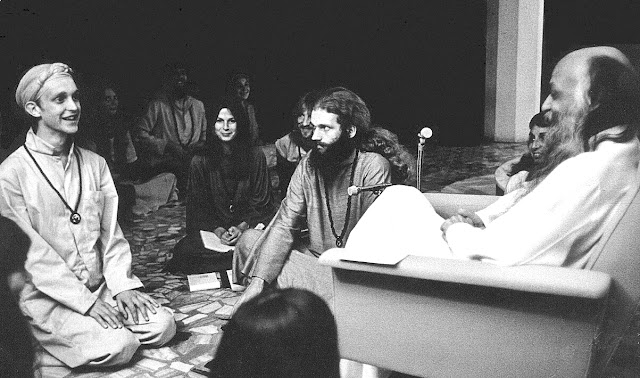India and Gurus!
A widespread chaos has spread in Northern India with the conviction of Gurmeet Ram Rahim Singh in a case of sexual assault. This has put the credibility of Gurus in different parts of the country to test.
Foreign media is questioning how a modern India could be in thrall of these self-styled godmen or Gurus.
Here are some excerpts from the coverage of this event by international media houses -
BBC - "How a divided India fuelled the rise of the gurus?"
Washington Post - "If anything, however, the situation in Panchkula illustrates how intractable the guru world remains in India’s globalizing social and political circles.”
France24 - “Like other thousands of gurus in India, Gurmeet Ram Rahim Singh is, above all, a powerful man.”
Australia's ABC - “Some Indian holy men can summon thousands of supporters on to the streets. Their systems of patronage and sermons are hugely popular with people who think the government has failed them.”
So, let's explore the history and reality of Gurus in India and decide whether is it right to consider a single incident as a prototype of the functioning of all deras and ashrams in the country.
The term Guru, originated in India - one of the oldest civilisations in the world.This place is also the pioneer of guru-shishya tradition, a relationship where teachings are transmitted from a guru(teacher) to shishya(disciple).
This spiritual relationship finds its place in various religions such as Hinduism, Jainism, Sikhism and Buddhism.
In the Upanishads, gurus and disciples appear in a variety of settings. The relationship between Krishna and Arjuna in the Bhagavad Gita portion of the Mahabharata, and between Rama and Hanuman in the Ramayana, are examples.
Even, Lord Rama, an incarnation of Vishnu, professed Viswamitra Muni as his Guru and Krishna too took lessons from Sandipani Muni.
So, there is nothing wrong in following a guru or adopting his teachings. Professing someone as one's Guru is not a sign of illiteracy or an unprogressive thinking.
International media is making mockery of the current situation in India by taking a dig at the illiteracy and retrogressive thinking of the people who start following a Guru without giving a second thought.
What these prestigious media houses need to understand is the fact that millions of 'educated' and so called 'heterodox' people from their countries flock to India seeking inner peace and solace from these Gurus. About 8.9 million foreign tourists visited India in 2016 alone, quite evidently reflecting their eagerness for 'spiritual tourism'.
The principles of Hinduism and India were first introduced to the western world by Swami Vivekananda at The Parliament of the World's Religions where the audience was so impressed by his speech that he received a two minutes standing ovation from the crowd of 7,000. Next day, the New York Herald noted, "Vivekananda is undoubtedly the greatest figure in the Parliament of Religions. After hearing him we feel how foolish it is to send missionaries to this learned nation".
By the second half of 1967, The Beatles (a famous rock band) were searching for answers to some of life’s larger questions. This search lead them to meditation, Eastern philosophy and, eventually, to Rishikesh, India, where, on Feb. 15, 1968, they began a period of study with the Maharishi Mahesh Yogi.
In 1970s, young people like hippies turned to gurus because they wanted to get high without drugs.
Now, let's quote some examples from 21st century.
Facebook CEO Mark Zuckerberg, in his visit to India, revealed that when his company was going through a rough patch, Steve Jobs advised him to visit the Ashram of Baba Neem Karoli in Uttarakhand where he himself had got the vision to create Apple.
Hollywood actress Julia Roberts is also said to be influenced by Neem Karoli Baba and was drawn to Hinduism because of him.
The instances stated above are sufficient for foreign media to understand the significance and the impact of Gurus and our traditions on their lives as well as ours.
The Indian media should also recognize and appreciate the rich culture of India and should abstain from making derogatory remarks on all the gurus taking example of a single one.
At last, I want to just say that India has been known for striking a balance between 'religion' and 'diversity' ; 'devotion' and 'commotion' arising from it and 'orthodox' and 'modern' culture for centuries and a single incident is incapable of thwarting the integrity of this very nation.
- AMAN BANSAL
FOLLOW ON TWITTER - @bansalaman23
LIKE ON FACEBOOK - Shayari Ke Khatir
Here are some excerpts from the coverage of this event by international media houses -
BBC - "How a divided India fuelled the rise of the gurus?"
Washington Post - "If anything, however, the situation in Panchkula illustrates how intractable the guru world remains in India’s globalizing social and political circles.”
France24 - “Like other thousands of gurus in India, Gurmeet Ram Rahim Singh is, above all, a powerful man.”
Australia's ABC - “Some Indian holy men can summon thousands of supporters on to the streets. Their systems of patronage and sermons are hugely popular with people who think the government has failed them.”
So, let's explore the history and reality of Gurus in India and decide whether is it right to consider a single incident as a prototype of the functioning of all deras and ashrams in the country.
The term Guru, originated in India - one of the oldest civilisations in the world.This place is also the pioneer of guru-shishya tradition, a relationship where teachings are transmitted from a guru(teacher) to shishya(disciple).
This spiritual relationship finds its place in various religions such as Hinduism, Jainism, Sikhism and Buddhism.
In the Upanishads, gurus and disciples appear in a variety of settings. The relationship between Krishna and Arjuna in the Bhagavad Gita portion of the Mahabharata, and between Rama and Hanuman in the Ramayana, are examples.
Even, Lord Rama, an incarnation of Vishnu, professed Viswamitra Muni as his Guru and Krishna too took lessons from Sandipani Muni.
So, there is nothing wrong in following a guru or adopting his teachings. Professing someone as one's Guru is not a sign of illiteracy or an unprogressive thinking.
International media is making mockery of the current situation in India by taking a dig at the illiteracy and retrogressive thinking of the people who start following a Guru without giving a second thought.
What these prestigious media houses need to understand is the fact that millions of 'educated' and so called 'heterodox' people from their countries flock to India seeking inner peace and solace from these Gurus. About 8.9 million foreign tourists visited India in 2016 alone, quite evidently reflecting their eagerness for 'spiritual tourism'.
The principles of Hinduism and India were first introduced to the western world by Swami Vivekananda at The Parliament of the World's Religions where the audience was so impressed by his speech that he received a two minutes standing ovation from the crowd of 7,000. Next day, the New York Herald noted, "Vivekananda is undoubtedly the greatest figure in the Parliament of Religions. After hearing him we feel how foolish it is to send missionaries to this learned nation".
By the second half of 1967, The Beatles (a famous rock band) were searching for answers to some of life’s larger questions. This search lead them to meditation, Eastern philosophy and, eventually, to Rishikesh, India, where, on Feb. 15, 1968, they began a period of study with the Maharishi Mahesh Yogi.
In 1970s, young people like hippies turned to gurus because they wanted to get high without drugs.
Now, let's quote some examples from 21st century.
Facebook CEO Mark Zuckerberg, in his visit to India, revealed that when his company was going through a rough patch, Steve Jobs advised him to visit the Ashram of Baba Neem Karoli in Uttarakhand where he himself had got the vision to create Apple.
Hollywood actress Julia Roberts is also said to be influenced by Neem Karoli Baba and was drawn to Hinduism because of him.
The instances stated above are sufficient for foreign media to understand the significance and the impact of Gurus and our traditions on their lives as well as ours.
The Indian media should also recognize and appreciate the rich culture of India and should abstain from making derogatory remarks on all the gurus taking example of a single one.
At last, I want to just say that India has been known for striking a balance between 'religion' and 'diversity' ; 'devotion' and 'commotion' arising from it and 'orthodox' and 'modern' culture for centuries and a single incident is incapable of thwarting the integrity of this very nation.
- AMAN BANSAL
FOLLOW ON TWITTER - @bansalaman23
LIKE ON FACEBOOK - Shayari Ke Khatir





Comments
Post a Comment